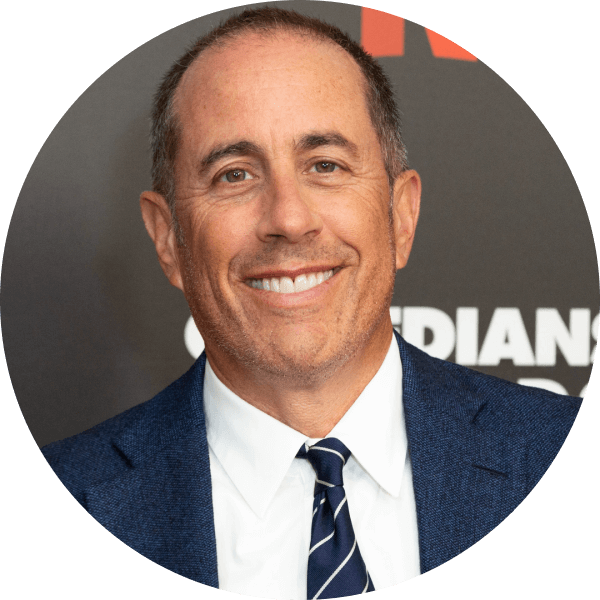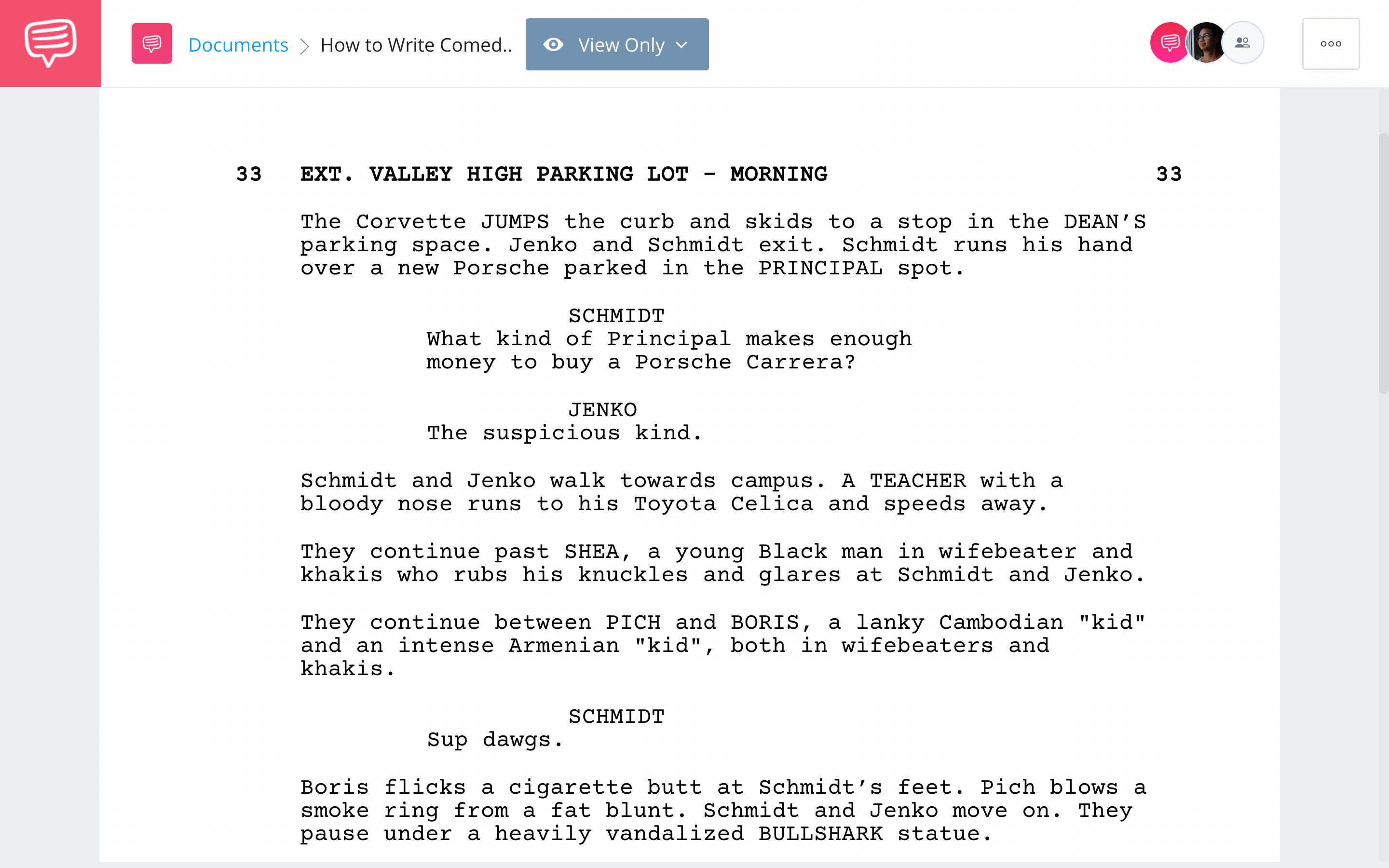Ask any creative writer what the hardest genre to write is and they’ll probably tell you that it’s comedy. That’s because story structure can only bring you so far in comedy writing – the fact of the matter is that if you aren’t funny, you aren’t funny. So how do you become funny? Do you read joke books? No! Like everything else, you practice until you become perfect – well, not perfect per se – most comedy writers would be happy with just okay. We’re going to show you how to write comedy, with script examples from 21 Jump Street and Curb Your Enthusiasm, but first, let’s define comedy writing.
Guide to Comedic Writing
What is comedy writing?
In simplest terms, comedy writing is a genre of writing that is intended to be funny. There’s much more to it than that, but first and foremost, the chief goal is to make the audience laugh. Let’s watch a quick video to hear one of the most successful comedy writers of all-time, Jerry Seinfeld, explain the basics of comedy writing.
Writing Comedy • Jerry Seinfeld on How to Write a Joke With The New York Times

Comedy writing is something you don’t see people doing. It’s a secretive thing.
— Jerry Seinfeld
As Seinfeld suggests, comedy writing is a very secretive thing. One reason why is because most comedy writers feel like their material has to be perfect before it’s presented.
Think about it this way: let’s say you write a dramatic stage play. There’s no way to tell if the audience hated it – except if they fell asleep, then I’d say it’s fair to say they hated it. Now let’s say you write a comedic play. If the audience doesn’t laugh at the jokes, then you know they hated it.
You know, they know, everybody knows – a joke that doesn’t land is a special type of shame. It’s for this reason that comedy writing can feel so personal. The most important thing to remember is that nobody is funny 100% of the time, but by taking inspiration from some of the best, we can improve our craft.
Comedy writing doesn’t have to be a solitary craft. Due to the advent of the internet, comedy is more collaborative now more than ever. This next video explains how the Lonely Island sketch “Dear Sister” helped to usher in a new era of comedy.
How to Write Comedy • How ‘Dear Sister’ Changed Comedy by Karsten Runquist
The difference between Seinfeld’s traditionalist advice on comedy writing and Karsten Runquist’s new-age analysis is that one says that comedy is achieved by plot; the other says that plot is achieved by comedy. Think of memes for example: what makes a meme funny? Well, I’d say memes are funny because somebody doesn’t “get it.”
A meme is like an inside joke between millions of people – but once it breaks out of that “inside” bubble, then it ceases to be funny. This teaches us something essential about comedy writing; almost always, somebody has to be the butt of the joke. No matter how big or small, somebody has to be made fun of. It’s this very notion that makes comedy writing so difficult.
Rules of Comedy, Explained
Tips and tricks for writing comedy
One of the most difficult aspects of comedy script writing is finding the right person to perform it. You could write something really clever, but if it’s performed in a tone that’s incongruent to what you mean, then it’s not going to sound funny.
So when writing any sort of comedy, don’t be afraid to add emphasis. That’s true in more ways than one – emphasize the punch-lines to your jokes, emphasize specificity, and emphasize contradictions.
Like any type of writing, comedy writing relies on conflict. In this scene from Meet the Parents, the family patriarch Jack interrogates his daughter’s boyfriend Greg. Pay attention to how screenwriters Jim Herzfeld and John Hamburg entice us with character conflict.
How to Write Comedy • Watch the Meet the Parents Lie Detector Test Scene
I wanted to look at this scene for a couple reasons. The first is that it’s a great structural example of how to put together a comedic scene. The mean dad, clueless boyfriend trope is just that... a trope. So how do the writers make it feel refreshing and new?
Well, it starts with emphasis and exaggeration. Jack isn’t just any dad, he’s a former CIA operative. And Greg’s not just a clueless boyfriend, he’s a walking bad-luck charm. So in a structural sense, this relationship is primed for comedic conflict.
Here are five great tips for writing a comedy scene:
- Take a typical situation and exaggerate it
- Let tension build
- Use specificity
- Embarrass someone
- Finish with a bang
Now let’s see how Meet the Parents utilizes these five strategies.
- Greg is visiting his girlfriend’s family. This is a typical situation – and at some level, it’s something we can all relate to. But it’s exaggerated by Jack’s CIA background.
- Say you’re the writer of a story like Meet the Parents and you have a great structural conflict between two characters (Jack and Greg) – how do you take that tension and build it? Well, start by putting the two characters in close proximity.
- Specificity is a double-edged sword in comedy writing. Notice how Greg is wearing Jack’s pajamas with the little JB insignia on the chest-pocket? That’s funny. Notice how there are a bunch of pictures of Jack undercover in the CIA? That’s funny. And it’s funny because it’s not forced on us.
- Jack embarrasses Greg by asking him uncomfortable questions. Situationally, this is funny, and it’s elevated by Robert De Niro’s great deadpan delivery.
- Like Jerry Seinfeld said, always save the best joke for last. It’s an expectation in comedy writing that you’re going to end with a bang. In this scene from Meet the Parents, it’s when Jack asks Greg if he watches porn.
WRITING COMEDY TIPS
How to make your script funny
Would you believe me when I say there’s a secret technique you can use to instantly make any scene funnier? No, that sounds too good to be true! But alas, it is.
The technique known as irony – which is defined as being the opposite of what we expect – can turn any scene on its head.
We imported the 21 Jump Street screenplay into StudioBinder’s screenwriting software to take a closer look at a great example of irony. As you’re reading, think about how (and why) we expect “Valley High” to conform to a stereotype.How to Write Comedy • 21 Jump Street Screenplay
21 Jump Street went through a lengthy rewrite process. In this revision of the script, undercover cops Jenko and Schmidt arrive at a scene somewhat akin to what we see in the original tv show. There’s nothing wrong with the scene as it was originally written – but the final version of the scene shows just how much a difference irony can make.
Here, Jenko takes the lead, expecting to command the crowd like he did in high school. But as Bob Dylan famously said, the times are a-changin’.
How to Write Comedy • Watch 21 Jump Street
We expect Jenko to be considered “cool.” But instead, he’s condemned. Conversely, we expect Schmidt to be considered “lame.” But instead, he’s celebrated. This is irony. This character dynamic makes 21 Jump Street feel refreshing. If you’re considering writing a comedy script, think about how contrived character stereotypes can be subverted with irony.
Writing Comedy Taboos
Things to avoid in comedy writing
Most comedians will tell you that no topic is off-limits in comedy writing. And although that may be true, just remember that it’s really hard to make certain things funny – and you’re not going to win audiences over making jokes about taboo subject matter.
We’ve all heard the saying “read the room” before, but how do we “read the room” when we’re writing alone? Well, one way is to take notes when you’re out in public, then transcribe them into a routine, sketch, or scene later. If you know Larry David’s Curb Your Enthusiasm, then this process may sound familiar.
This next video explains Larry David’s writing process for Curb in further detail.
Comedy Writing Techniques • How to Write Comedy Like Larry David by StoryDive
The reason I bring up Curb in regards to “what to avoid in comedy writing” is because Larry David is a master of navigating that ever-so-delicate line. Take this clip from Curb Your Enthusiasm Season Nine, Ep. 8 for example.
How to Write Humor • Study Perspective in this Curb Your Enthusiasm Clip
In this montage scene, a Muslim investigator looks into Larry’s past to see if he deserves a fatwa. In each part of the montage, a delicate subject matter is addressed. Why is it funny? Well, it’s all about perspective. In Curb Your Enthusiasm, Larry is consistently made out to be the bad guy. By framing him as the good guy, we see the ludicrousy of the show’s situations in a new light.
Don’t be afraid to play with perspective. Sometimes, the comedy of a scene is found in a perspective you would’ve never guessed. Consider framing your comedic situations in different ways.
This experimentation will often help you find the best angle to present your jokes.
Up Next
Comedy lessons from Gene Wilder
We touched on a lot of the foundational aspects of comedy writing, but there’s so much more to it than what we went over here. In this next article, we break down how to direct actors, with special emphasis on how Gene Wilder changed comedy. By studying Wilder’s comedic style, we can learn a lot about how to be a better comedy writer.

